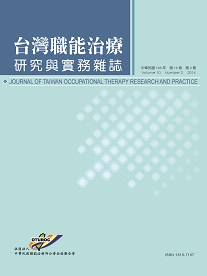Journal of Taiwan Occupational Therapy Research and Practice

半年刊,正常發行
目的:本研究旨在探討慢性思覺失調症者在四個月期間,接受八次性別教育課程後,對建立健全性別觀點的成效。方法:採準實驗(quasi-experiments) 之不等組前後測控制組設計,以便利取樣,研究參與者取自南區某養護機構中慢性思覺失調症者99 名,多數為男性(64.6%);障礙等級屬於中度以下(50.5%) 與重度以上(49.5%) 相差不大;婚姻狀況未婚(76.8%) 較曾結婚(23.2%) 居多數;年齡分佈在55.21±8.28 歲;教育年數分佈在8.71±3.11 年。研究參與者有43 位分派至實驗組,56 位分派至控制組。研究期間為100年10 月起至101 年02 月止,團體開始前1 至2 週兩組各進行前測,之後,實驗組進行八次性別教育團體課程,控制組則參與常規性活動而不介入團體課程。實驗結束後1 至2週,兩組再進行後測以比較其對性別觀點的差異。研究工具以「自編性別關係問卷」來評量參與者的性別觀點,該量表內部一致性信度Cronbach´s α 達 .714。所得資料透過描述統計分析、卡方考驗、配對樣本t 考驗、獨立樣本t 考驗、麥內瑪考驗等方法進行資料處理。結果:實驗組與控制組在障礙等級(p = .006) 及年齡(p = .024) 兩組之差異均達 .05顯著水準。實驗組與控制組對性別觀點之前測結果有顯著差異(t = -3.301, p = .001);經八次性別教育課程後,實驗組與控制組的對性別觀點之後測結果呈無顯著差異(t = -.252, p = .802);實驗組進步分數顯著高於控制組(t = 4.160, p < .001),顯示性別教育課程之實驗處理可以提升研究參與者對性別之正確觀點。結論:由研究結果顯示為期八次的性別教育課程有助於提升慢性思覺失調症者之性別觀點。本研究之「自編性別關係問卷」尚在發展階段,結果僅可做為精神障礙養護機構推展性別教育工作之參考。
Objective: The purpose of this study was to explore the effect of gender education on improving chronic schizophrenics’s perspectives about gender. Methods: This study used a quasi-experimental nonequivalent pretest-posttest control group design. Using convenience sampling, 99 participants with chronic schizophrenics were selected from a sanatorium institution in southern Taiwan and divided into an experimental group (n = 43) and a control group (n = 56). The experimental group was assigned to a 8 sessions of gender education. The control group participated in routine activities. This gender relations questionnaire was used to assess participants’ perspectives about gender. Then, descriptive statistics, chi-square test, paired sample t test, independent sample t test, and McNemar changing significance test were used for data analysis. Results: There were significant differences in the degrees of disability (p = .006) and age (p = .024) between the experimental and control groups. The participants showed significant differences on pretest perspectives about gender between the experimental and control groups (t = -3.301, p = .001); After 8 sessions of gender education, there were no significant differences on posttest perspectives about gender between the experimental and control groups (t = -.252, p = .802). Gained scores in the experimental group were significantly higher than the control group (t = 4.160, p < .001). The correct perspectives about gender of the experimental group could be attributed to the intervention of gender education program. Conclusion: The results showed that gender education program could improve the perspectives about gender of chronic schizophrenics. The results could be regarded as a reference on promoting gender education for chronic schizophrenics in psychiatric sanatorium institutions.












